Trump And The Return Of Pre-Modern Incivility archive.today webpage capture Webpage Saved from http://thermidormag.com/trump-and-the-return-of-pre-modern-incivility/ search 15 Dec 2017 07:19:28 UTC history ←prior next→ All snapshots from host thermidormag.com Screenshot share download .zip report bug or abuse Hoyt Thorpe Thermidor donate 2 days ago MAGAZINE Home Blog Magazine Cinemath Podcast About Donate Trump And The Return Of Pre-Modern Incivility Upon President Trump's delivery of an impromptu "both sides" qualification addressing the tragic death of a counter-protestor at the infamous Charlottesville "Unite the Right" rally, prominent social psychologist Jonathan Haidt tweeted that Trump had "resigned as the leader of the American Civil Religion". Haidt's tweet included a screenshot of a Wikipedia article summarizing the late sociologist Robert N. Bellah's theory of Civil Religion, © 2017 Thermidor Magazine. Designed by Jonathan. which ascribes to the American people a common "set of values that foster social and cultural integration" and celebrates a pantheon of heroic martyrs and messiahs like Abraham Lincoln. In Haidt's view, Trump's assertion that there were "very fine people on both sides" amounted to an apology for racism and intolerance and thus an abdication of his chair as sectarian pontiff of our civil religion. Another more idiosyncratic sociologist named John Murray Cuddihy developed a different approach to Bellah's Civil Religion and its cultural antecedents in Europe. While Bellah focused on the content of individual speeches, publications, and pronouncements about America, Cuddihy looked to the daily face-to-face interactions of humans to divine another, perhaps more important, influence on the western psyche: the personal experience of Civil Religion. Cuddihy found that many, especially outsiders and minorities, experienced Civil Religion as a religion of civility - a "protestant esthetic" of bourgeois manners that was less about substantive values than about proper etiquette and interpersonal respect. In essence, Cuddihy had found the western rituals underlying our Civil Religion to be experienced by many as something closer to the "empty formalism" Bellah insisted our Civil Religion was not. The Trump era has stimulated a renewed and impassioned commentary on civility that raises fundamental questions about the nature and role of civility in American democracy, as well as the future of our civil religion and how it is experienced by America's ever-changing electorate. Cuddihy's unique account of how certain groups have experienced civility provides an incisive https://archive.is/jUY6x 1/21

Trump And The Return Of Pre-Modern Incivility explanation for Trump civility commentary today and ultimately serves as an unsettling portent about the future of our civil religion. Civility and Counter-Culture Cuddihy describes civility as a ritual exchange of "gifts" among strangers enabling us to "live with unknown others without transforming them into brothers or enemies." This ritual carries with it a differentiation between private and public behavior and spaces, with social appearances, respectability, and censorship (both self- and other-directed) coming to dominate the public sphere. In western Protestant society, civility demands public humility about one's wealth and power, respect for strangers, and censorship of one's private convictions about individuals and groups. The development of civility in western history is, for Cuddihy, bound to the refinement of "barbaric" behaviors, with the prototypical example being the refinement of the feudal baron into the high-modern aristocrat. One of Cuddihy's arguments was that the counter-culture ideologies that radically altered the course of western civilization in the 20th century originated in attacks upon civility. Such attacks reflected in one way or another outsider or minority anxieties about the relationship between civil rights and civility, of being accepted as a full and equal citizen in society, not just in terms of being granted political equality, but also in terms of being socially accepted by others as equal. Among the various counter-culture movements, Cuddihy selected Freudian psychoanalysis and Marxism as two of his most important case studies. Freud experienced civility as a sham ritual sublimating man's natural, barbaric impulses: the formal and respectful rituals of romantic love merely covered up with successive layers of refinement the brute reality of the sexual transactions between individuals. Other aspects of civility merely concealed the shocking Freudian "truth" of childhood sexuality and incest fantasies. Of course, such "scientific" reductions were not new to a western society increasingly secularized by Darwin and Newton. But the way in which Freud communicated his observations to the world was seemingly contrived to scandalize his audience. Many of Freud's colleagues lamented the impudence with which Freud discussed sexuality, and his correspondence is littered with stubborn declarations against self-censorship or euphemizing. This was, at least in Freud's view, because psychological malaise could only be ameliorated by attacking the euphemisms with which the superego and society censored the brute reality of human existence. "A science cannot be bourgeois," declared the founder of psychoanalysis, for bourgeois etiquette was merely a veil of petty lies obscuring our view of the truth. But behind the putative therapeutic and scientific goals of Freud's project, Cuddihy argues, lurked the mischievous motivations of a counter-cultural prankster. In one speech, for example, Freud mused about a "malicious fellow" https://archive.is/jUY6x 2/21
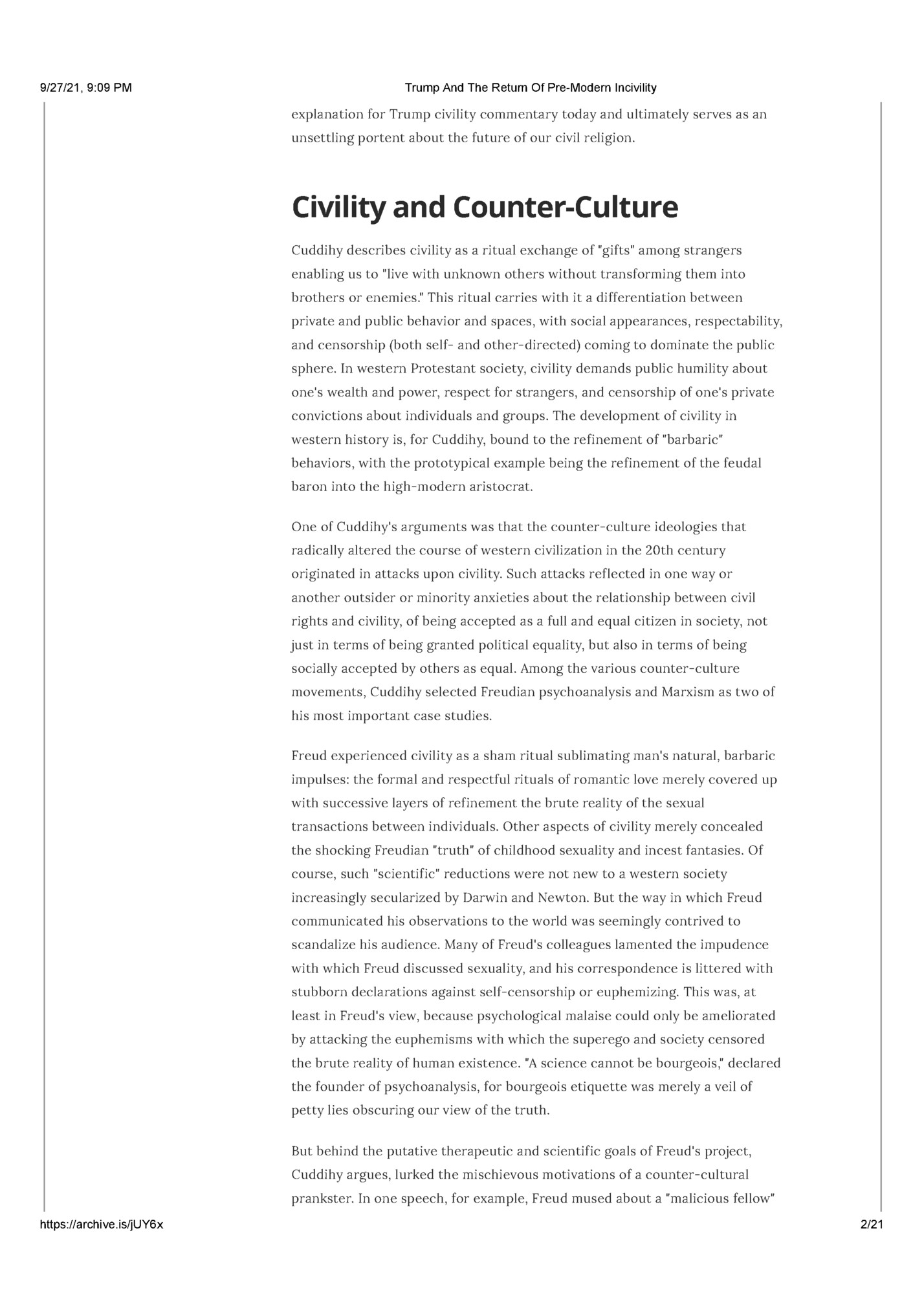
Trump And The Return Of Pre-Modern Incivility preventing women from euphemizing their bathroom breaks as "picking flowers" by distributing a document at a party that revealed the true meaning behind the innocent euphemism. Indeed, in Hannah Arendt's dismissive estimation, psychoanalysis was nothing more than a "modern form of indiscretion." Whatever Freud's ultimate motivations were, his remedy was a compromise with the religion of civility: indiscretions only were to be expressed during a closed analytic session. This compromise ultimately marks Freud, in Cuddihy's analysis, as a conservative or reform critic of civility to be contrasted with Marx, whose radical attack on the bourgeois order admitted of no compromise. Marx's professional career began much like Freud's - with an analysis of censorship in the shadow of the protestant censor - but his rebellion against civility began much earlier in life. As an assimilated Jew and Protestant convert, Marx's father lamented in letters his son's rebellious, counter-cultural drinking, dueling, profligacy, and predilection for, in Cuddihy's words, making "truth more important than sociability." The latter spirit erupted in a ferocious attack upon the Prussian censorship law which, although it did not censor the content - the substance and ideology - of publications, purported to censor tone. In his fulminations against the censor, Marx mocked liberal attempts to impose restraint and good manners on publications, arguing that tone policing was a "means of keeping one from the truth." The Prussian tone police approached speech in a way that dissolved the apparent distinction between a free citizen and respectable bourgeois, forcing the former to conform to the rules of propriety dictated by the latter. "I may be humorous", Marx quipped, "but the law orders that I write seriously." Marx argued that, much like Freud's superego, the censor had made the scientist's mind "an inquisitor" auditing the search for truth under the auspices of "police-regulated honorability and conventional good manners." In forcing respectability, moderation, tolerance, and good manners upon writers, the Prussian censor had effectively reinstated a form of content-specific censorship, because offensive utterances and unsavory truths were deemed poor taste. Marx instead championed the wisdom of the crude masses, which he contended were always ready to confront unsavory truths and offensive language. Tone policing might protect elites from the harmful effects of uncouth truth, but it had no effect upon the masses, for whom the brute facts of existence were readily apparent. Marx would go on to escape the Prussian censor, becoming a communist and writing his classic works, while also expanding upon his original critique of civility and censorship. In his mature works, Marx unloaded his imposing philosophical and rhetorical arsenal at the naive pride of bourgeois gentlemen who claimed to have overcome the vulgar haggling and avariciousness of primitive capitalism. For Marx, Bourgeois property was tied to and coevolved with bourgeois propriety, creating a superstructure of civil rituals designed to conceal the brute, exploitative reality of parasitic capitalism. Whereas Hegel https://archive.is/jUY6x 3/21
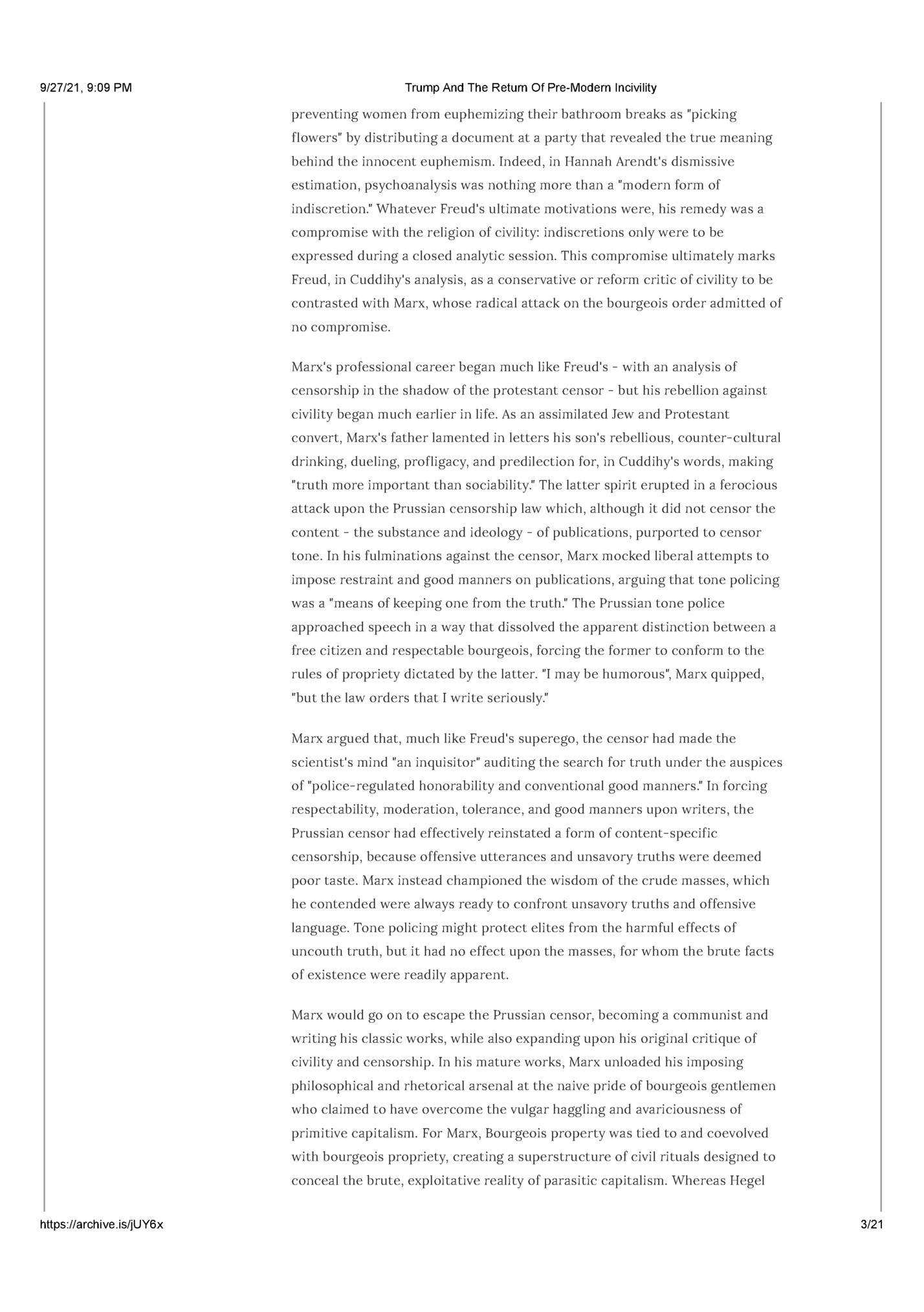
Trump And The Return Of Pre-Modern Incivility rationalized modern capitalism by having civil society assimilate selfishness with the common good, Marx reversed the insight, contending that civil society merely existed to conceal and rationalize the vulgar, parasitic exploitation perpetrated by bourgeois gentlemen. In a brilliant set of analogies, Cuddihy shows how closely Freud and Marx's seemingly distinct projects converge on the function of civility. Just as the west deluded itself into thinking that love had eliminated selfish haggling from courtship, so it had also deluded itself that modern capitalism had eliminated selfish haggling from exchange. The industrial revolution may have attempted to sublimate the selfishness of the feudal west under Calvinism, but Marx's experience with the Prussian censor helped him see through the conceit. His therapy for a hypocritical, deluded society was, like Freud's, an uncensored confrontation with the brute facts underlying bourgeois society. Civility Today Looking closer to his own time, Cuddihy saw reflections of an ongoing revolt against civility in the sit-ins on buses and in restaurants during the civil rights movement, where activists had attempted to "disentangle civil liberties from social civilities". The success of the civil rights movement exposed other public places to demonstrations and "misbehaviors", culminating in the 1968 Democratic Convention and the trial of the Chicago Seven for incitement, during which the defendants profaned the civil space of the Anglo-Saxon court with outbursts of uncouth and vulgar behavior. In Cuddihy's eyes, Abbie Hoffman's famous sentencing declaration, "[w]hen decorum is repression, the only dignity that free men have is to speak out", articulated the hidden essence of the civil rights movement. Here again the religion of civility had been experienced as hypocrisy and was indicted for concealing and rationalizing repression, only this time the revolt against civility explicitly identified with a cool new counter-culture in the Yippies. Today many of our most august and respected public figures identify as heirs to or direct participants in the counter-cultural revolt against civility. While many of the more radical goals of counter-cultural intellectuals have fallen out of favor, the revolt against civility has left its mark on the values of western leadership, covering our most vocal and respected thinkers with a pall of counter-cultural cool. Nearly every sacred event, including the most recent Presidential inaugurations (the solemn coronation of our secular pontiff) are sound-tracked by the most uncivil of rappers, rock and rollers, and pop singers. Politicians openly schmooze with "vulgar" comedians and artists whose works are applauded for their blunt confrontation with reality and disrespectful dismissal of stifling, outdated pieties. Serious public intellectuals like Paul Krugman make a point of decrying calls for civility by arguing in numerous op-eds that incivility is often justified and that calls for civility preclude serious consideration of the truth. In academia, professors like Brian https://archive.is/jUY6x 4/21
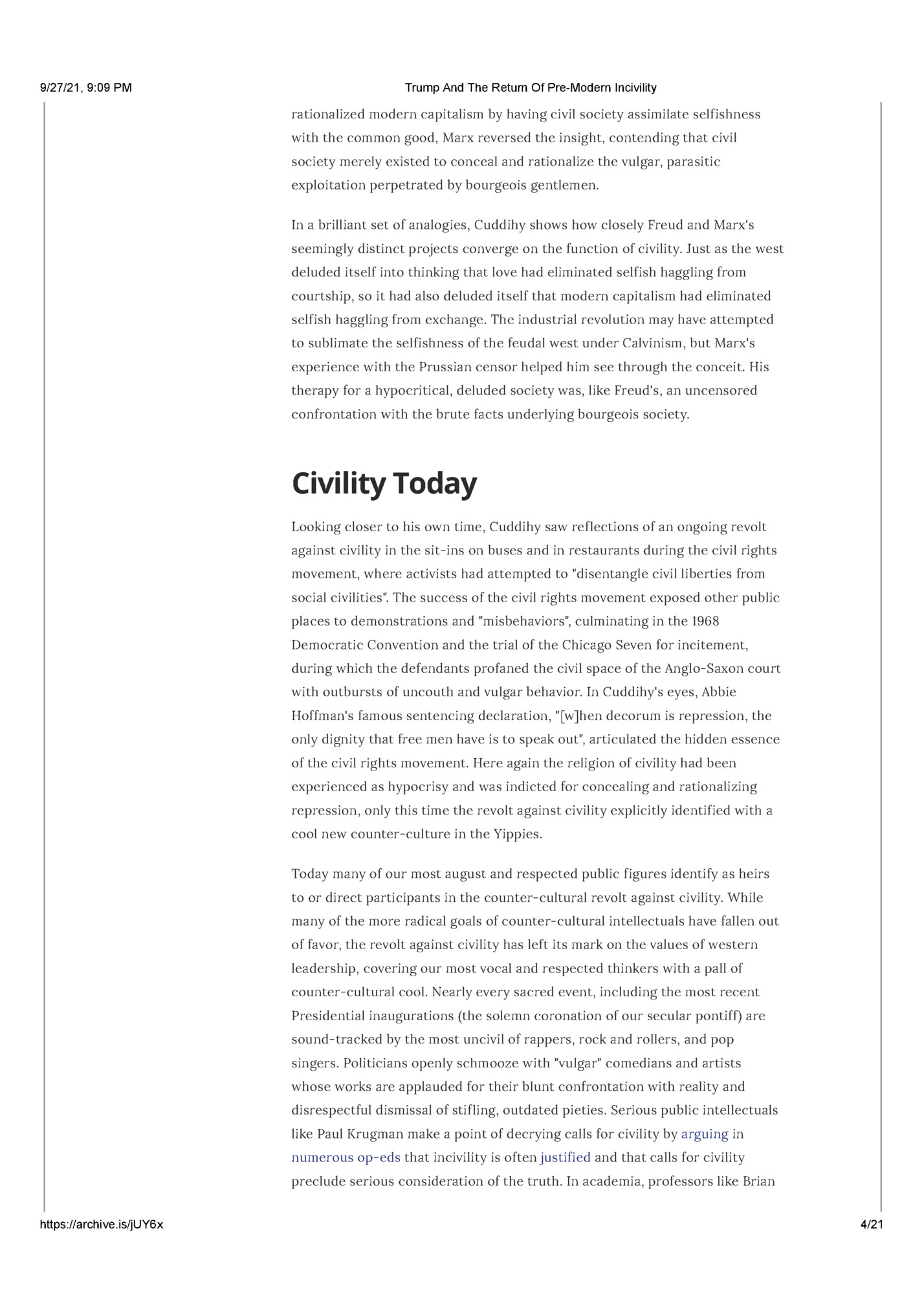
Trump And The Return Of Pre-Modern Incivility Leiter have updated the old Marxist explanation of civility, criticizing its political use for conferring "moral and epistemic status" on people otherwise undeserving of civil treatment, like Nazis. Even the conservative right has gotten in on the action, as Hua Hsu observed in a 2014 New Yorker article, by seeing in civility "political correctness by a different name." Against this background of cool establishment incivility emerges Trump. He had of course always been there in pop culture or on the periphery of politics as an amusing sideshow to be tolerated and mocked by our public leaders, but never as a serious threat to the sanctity of public office. When he finally emerged as a legitimate challenger in the Presidential race, the public was subjected to a deluge of civility commentary that was unique in both kind and volume. Trump's incivility, which was also by necessity politically incorrect, had exposed a latent tension in the public culture of counter-cultural cool. The Incivil and Politically Incorrect Id The varied attempts in the press to deal with the cognitive dissonance stimulated by this tension often, and quite appropriately, begin with explicit or implicit comparisons to Freud's concept of the Id. In "Donald Trump and the American Id", conservative Kevin D. Williamson declares Trump to be a "posterotic pornographer" appealing to the base desires and fantasies of his supporters, whose incivil language betrays "insecurities" about sexuality and manliness. Similarly, Eli Zaretsky looks to "political Freudianism" in "American Id: Freud on Trump" to understand the "desires, impulses and fantasies excluded from mainstream politics" animating Trump's broad appeal. Like Zaretsky, Tanveer Ahmed in his "Trump is our id, the Left is our Superego" sees in Trumpism a return "to the primeval Father" whom Trump supporters both envy and fear. In contrast, Jon Greenway sees "Donald Trump: The Id of Republican Politics" appealing to the "visceral, the capitalist, and the patriarchal" in order to pull decent folk away from the Reagan superego. By expressing the "dark, twisted, and unacceptable elements of right-wing political discourse", Trump makes explicit what the GOP had previously hidden, and what Greenway demands we repress: "racism, misogyny, and capitalist priapism." These authors betray an anxiety about the relationship between Trump's incivility and politically unfavorable consequences, which reflects in turn the obvious conceptual overlap between civility and political correctness. Philosophy Professor Karen Stohr's New York Times op-ed on "Our New Age of Contempt" makes explicit this contemporary link between civility and political correctness. In her article, Stohr laments the emergence of contempt and incivility from "behind closed doors, in low tones not meant to be overheard" into the open where "raw feelings" are "exposed." The Trumpian Id must be suppressed not only because of Immanuel Kant's conclusion that "stability and https://archive.is/jUY6x 5/21
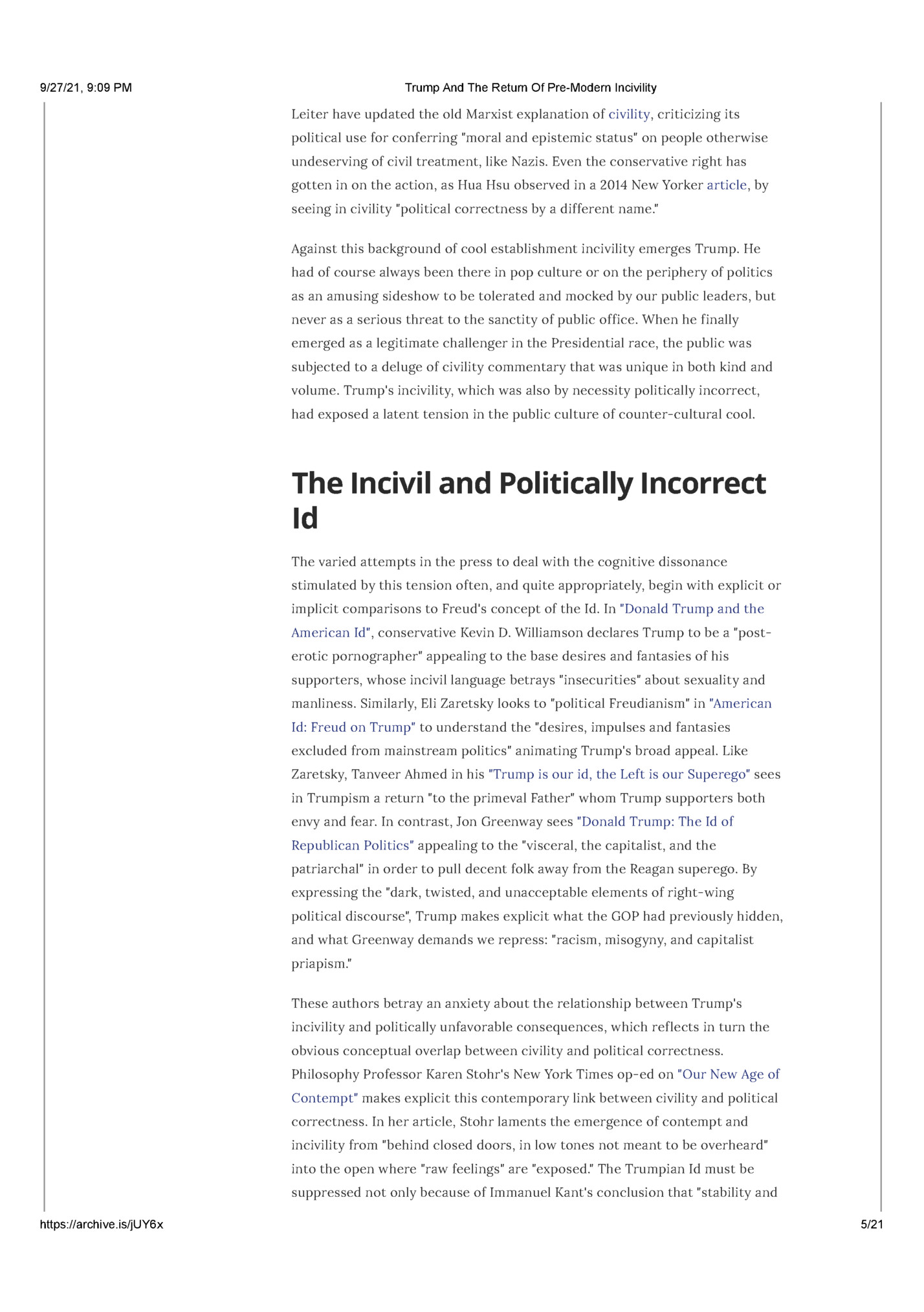
Trump And The Return Of Pre-Modern Incivility progress depend upon self-restraint," but also because contempt "dehumanizes" and undermines the "moral basis of all human relationships." For Stohr, Trumpian incivility has political consequences that are objectively unacceptable in our Republic. Trump's putative mockery of a journalist with palsy, like his putative ascription of rape to all Mexican immigrants, profaned the civil space of public discourse, especially because Trump was incivil to apparently "weak" groups from a position of power. By Stohr's ethic, Trump must play the good protestant progressive and conceal his private views, lest he politically repress the weak and powerless through incivility. Thus, political correctness can be understood in this context as the proposition that the public deference of our civility ritual is owed especially to specific groups and identities. In July of 2016, Josh Barro echoed another common angle taken against Trump (which we'll revisit later in a different context): his taste for gaudy decor. Trump's "tacky, ostentatious...thronelike chairs" were as revelatory of poor political judgment as his statements about penis size and Mexican rapists. Barro ultimately warns us "as a gay man" that "Trump's vulgarity also matters for things more serious than furniture", especially things like "prejudices and hatreds that people have kept quiet about", like homophobia. According to Barro, Trump's vulgarity permits the public to stop "faking it until they make it" - that is, stop concealing their visceral, Id-derived instincts about homosexuality, women, and Mexicans, until those instincts are sublimated by more refined, more tolerant, and more civil instincts (and presumably, better taste in decor). Beyond Trump's incivil commentary and garish taste in decor, Kathleen Parker's Washington Post op-ed on Greg Gianforte's "body slam" sees political hazards in Trump's incivil physical behavior abroad. Her underlying logic is the same as Stohr and Barro's: incivility toward officially designated weak groups or individuals is politically unacceptable. Written before the global scandal of Trump's handshake wars in France, Parker asserts that Trump's first foreign "coup de uncouth" was pushing Montenegrin Prime Minister Dusko Markovic out of the way at the NATO Summit. Instead of observing proper etiquette with "a light tap on the shoulder and at least a pretense of manners", Trump used impolite behavior to politically harm a victim of Russian bullying and ally in need of protection. But perhaps Trump's most confounding act of incivility occurred when he profaned the sacred venue of the Al Smith Charity Dinner, where one would expect a New York billionaire to fit in. The New York Times coverage of the event notes how Trump scandalized the audience in departing from lighthearted "ribbing" and going for darker, more personalized and contemptuous attacks upon Hillary Clinton. The Times then praises Clinton for attacking Trump's vulgar misogyny and surveys the litany of prestigious attendees, highlighting Trump's alienation from the venue. But the article also suggests that Hillary gained the upper hand in that ritual exchange of gifts known as the https://archive.is/jUY6x 6/21
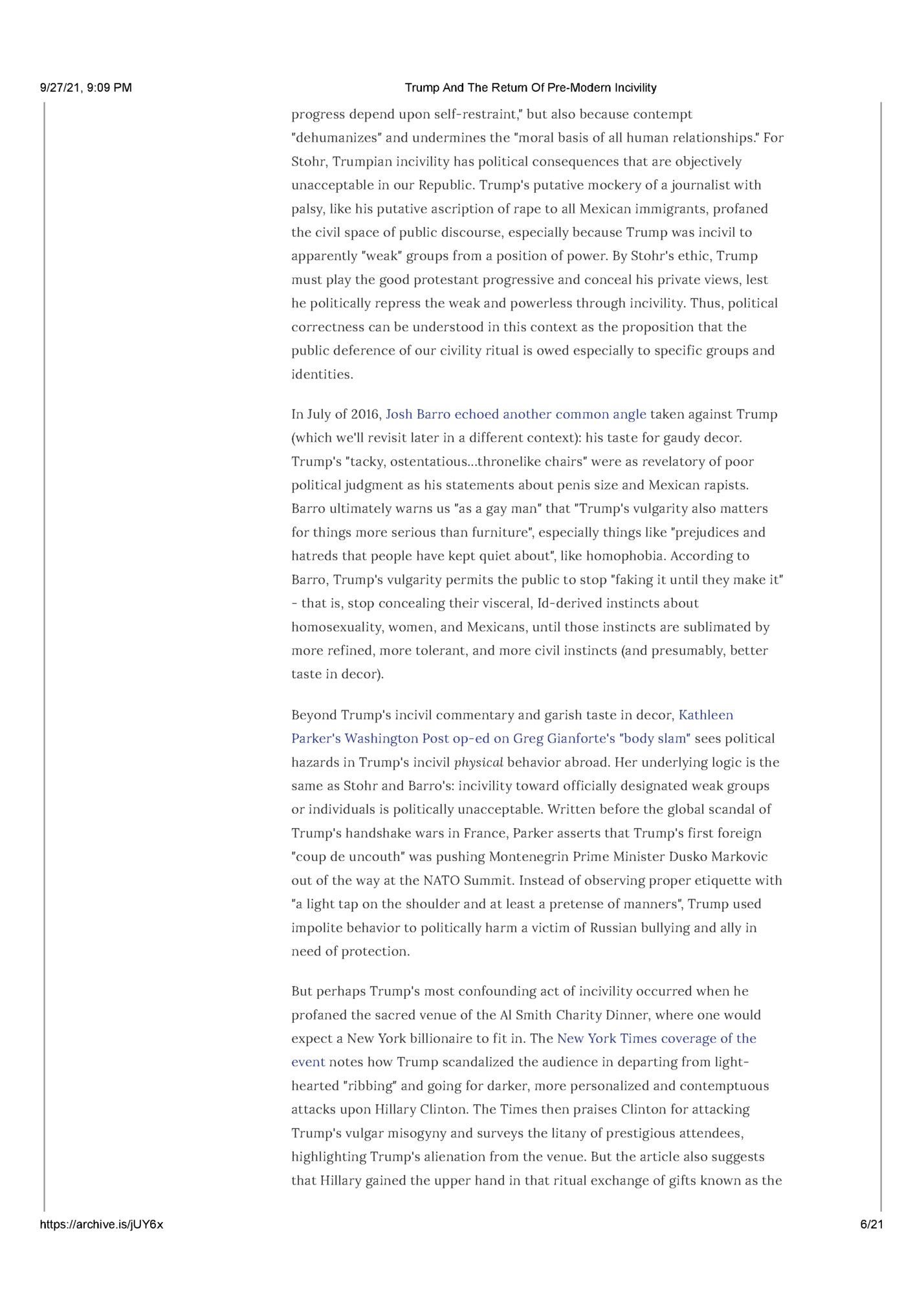
Trump And The Return Of Pre-Modern Incivility handshake by turning away from the shake before Trump. Indeed, the Times seems to suggest that it was in fact Trump who couldn't handle the warm familiarity and jocular atmosphere of the event. The up-tight Trump could only be loosened up by the cool and down-to-earth Clinton. In summary, Trump was both the uncouth pariah who broke "with decades of tradition" and was booed by the elite audience, but was also the uptight, serious, and uncool billionaire. The stretch to portray Clinton as cool and on equal footing with Trump exposes the latent tension distorting much of the Trump civility commentary. Many of the commentators who ritually wrung their wrists at Trump's incivility and political incorrectness also wished to preserve their claim upon countercultural cool, to make sure their own Ids were given full vent while the Trumpian Id was resublimated, like Josh Barro's celebration of his sexual orientation in his criticism of the Trumpian id. Additional examples can be found by surveying other articles by Trump civility commentators. For instance, in a March issue of that most civil of conservative publications, the National Review, Kevin Williamson unleashed his own Id in a declaration that "downscale" white working class communities "deserved to die". The same mediocre whites whose sexual insecurities were allowed vent by the Trumpian Id deserved the slow death they were experiencing. Similarly, after decrying the fact that Trump freed the "dirty little ids of his Twitter feed's tiniest minds", Kathleen Parker engages in her own vulgar and incivil sexual innuendo about the "[sexual] limitations" of Trump's followers. And of course the oft-repeated refrain that Trump's incivility is dehumanizing can be compared to the outcry against Jimmy Fallon for his "humanization" of Trump on the Late Show. It's clear that this tension arises from the fact that commentators are offended by Trump's political incorrectness and vulgarity, but are also ensconced in a culture where being cool, real, and incivil is popular, and where political correctness is perceived as submissiveness. Some of the more self-reflective commentators, acknowledging this tension, sought to preserve their contradictory criticisms of Trump's incivility by offering the rationalizations that Trump was either just being vulgar and not politically incorrect, or was in fact the real icon of political correctness during the campaign. Parker's "Trump isn't politically incorrect. He's just simply incorrect" begins with the familiar Freudian analysis of Trumpism, observing that Trump supporters misdefine political incorrectness as "whatever slips from gray matter to tongue without inhibitory processing that civilization demands." Excessive political correctness is indeed a problem, Parker concedes, but Parker cautions that merely insulting people and being vulgar is not in itself politically incorrect. Proper political incorrectness, proper counterculturalism, for Parker, is actually civil. To support her argument, Parker translates Trump's Mexican Rapist statement into something palatable to bourgeois taste: https://archive.is/jUY6x 7/21
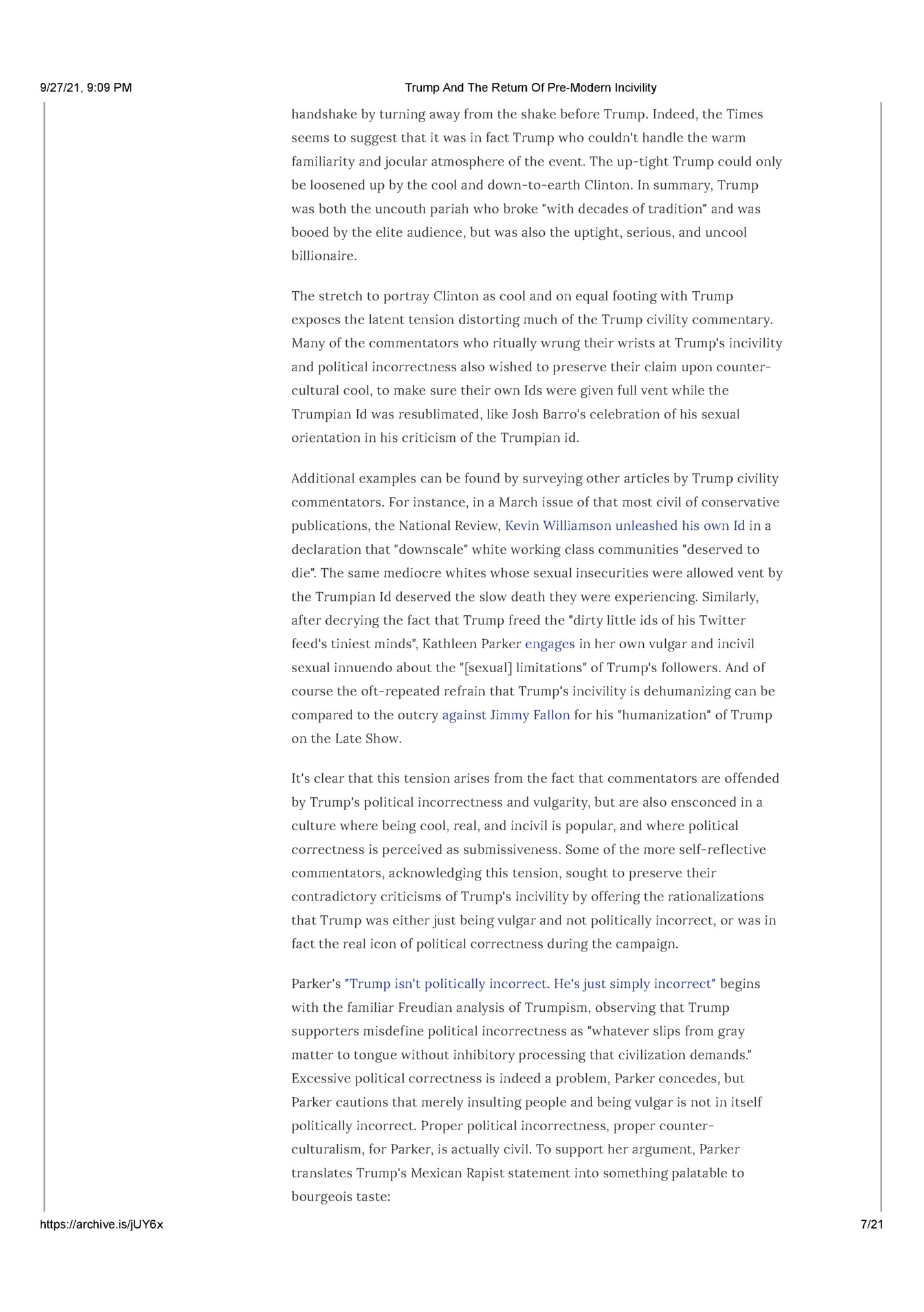
Trump And The Return Of Pre-Modern Incivility "You could say, for example, that we need to secure our borders because, though most immigrants are good people in search of a better life, others are criminals or criminal-minded. This is both true and lacking in drama." This, of course, captures none of the implications of Trump's statement and smuggles in respectful, flattering assumptions about immigrants that Trump clearly didn't intend to convey. Thus, like Karen Stohr, Parker interprets certain kinds of empirical statements as contemptuous insults that must be censored or euphemized, and stresses the propriety of exercising civility or deference toward a specific group. Here, at least from the perspective of a Trump supporter, we are very close to the tone policing-cum-content censorship against which Marx railed in protestant Europe. On the far right, Jonah Goldberg's own National Review article exhibits a similar desire to hold onto the prestige conferred by being un-PC. For Goldberg, Trump's vulgarity is just "smarmy cowardice" whereas true un-PC behavior is about having manners and being respectful. In an age of liberal counter-culture, Goldberg engages in genuine un-PC rebellion by re-enacting the rituals of civility's cultural progenitor: chivalry. Goldberg proudly declares that, in opposition to Trump's misogyny and the politically correct spirit of the age, he holds "doors open for women" and stands up "whenever a woman enters the room." In "For Trump, being politically incorrect is now 'PC'", liberal professor Stuart Brotman mirrors Goldberg's logic by looking at polling data and redefining political correctness as whatever the majority believes. Because polls demonstrate the majority oppose political correctness, being anti-politically correct must, according to Brotman, be politically correct. Thus, the minority view that we should embrace civility and "favor more care with language to avoid offending people" is now politically incorrect. While other articles like Mitchell Blatt's "How Donald Trump Makes Political Correctness Worse" and Anne-Marie Slaughter's "Of George Washington, Donald Trump, and Civility" try to split the hair between strands of righteous political incorrectness and mere incivility or "hatefulness", Conor Friedersdorf succeeds in perfecting the rationalization. In "The Politically Correct Presidency of Donald Trump", Friedersdorf concedes that Trump is truly counter-cultural in the sense that he offends political sensibilities across the political spectrum, but qualifies that Trump's "lodestar" is a false dogma that demands its own rituals of deference. Trump's "refusal to deal with the world as it is", unique and offensive though it may be, is nonetheless analogous to the sham ritual of civility exposed by Freud and Marx. Against Trump's political correctness, Friedersdorf positions President Obama's couth political incorrectness, pointing to the exemplary contrast between Trump's reticence about right-wing extremism and Obama's reticence about Islamic extremism. Obama understood the nature of the threat, as exhibited by his use of lethal measures against extremists, but chose his words https://archive.is/jUY6x 8/21
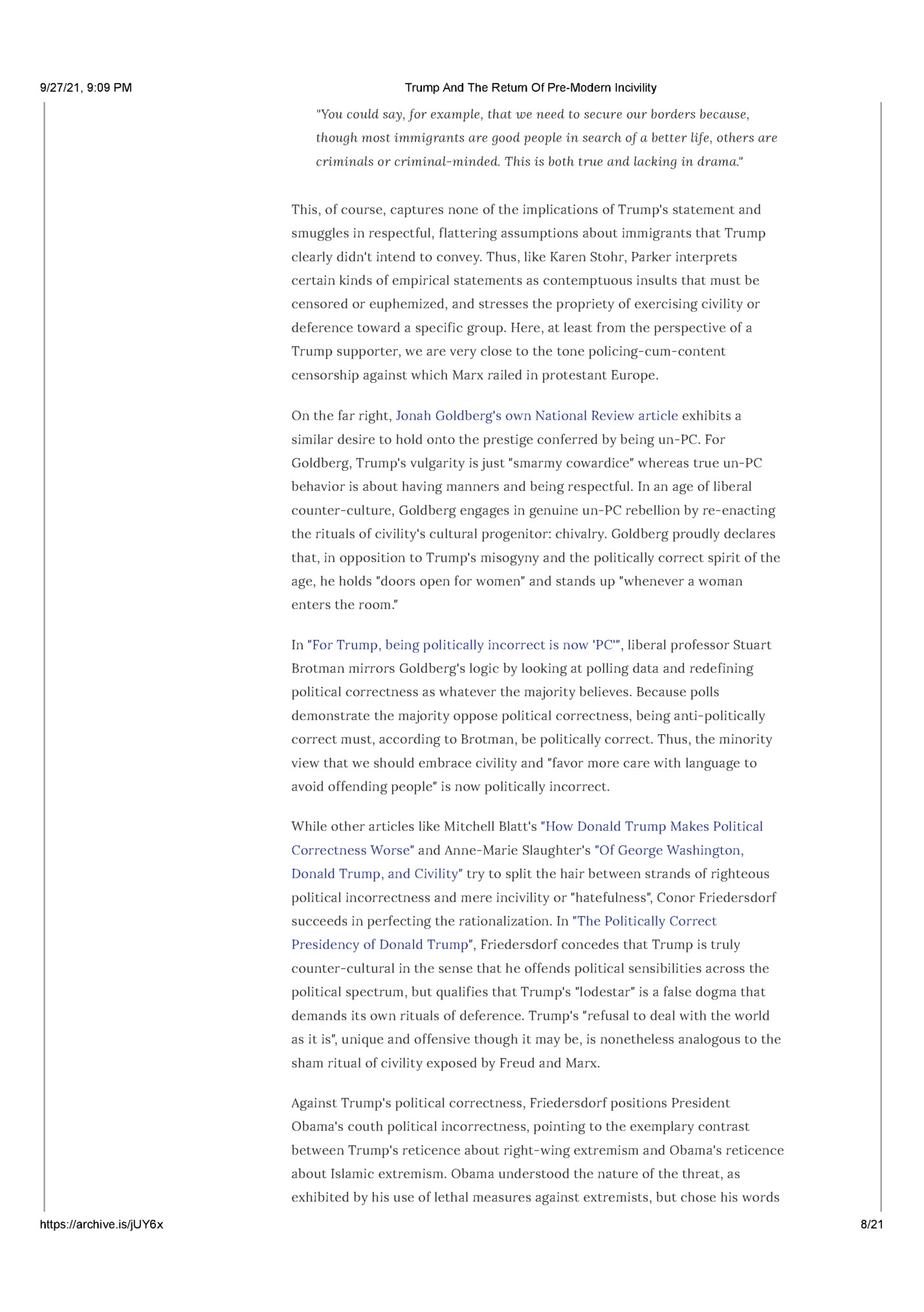
Trump And The Return Of Pre-Modern Incivility carefully - civilly - to "avoid legitimating the claims of religious extremists" and offending Muslims. In contrast, Trump remained silent on right-wing extremism: a politically correct silence, Friedersdorf contends, because it legitimated the dogmas of his supporters. In short, killing Islamic extremists while addressing Islamic extremism civilly was not political correctness on Obama's part, while Trump's silence on right-wing extremism was politically correct repression. The ethic undergirding the Friedersdorf approach is especially popular among legal commentators and underscores the extent to which civility is concerned with censoring affect and intent. Benjamin Wittes's Lawfareblog post on travel bans (echoing the reasoning underlying many of the 9th Circuit's failed attempts to stall Trump executive orders) states that Obama's drone program was morally superior to Trump's travel bans because, while droning civilians is bad, it wasn't "malevolent" like Trump's travel ban. In other words, Obama's foreign policy failures were insulated by protestant (Kantian) good will - a veneer of civility and bureaucratic-technocratic detachment reassuring us that Obama's office was purely animated by nice intentions. Such complex and contradictory apologia invite many questions. Why are these commentators focused on criticizing Trump's incivility and simultaneously undermining his claim to being politically incorrect? Why does civility coexist with the valorization of incivility? Why the urgent need to qualify and justify? To explain the paradox of commentators with liberated, incivil Ids demanding that Trump and his supporters refine their own Ids, we must return to sociology. The Pre-modern and the Modern In an entertaining blog post comparing the Trumps to the Sopranos, celebrated sociologist Randall Collins claims "[t]he Trumps are another family in the premodern mold", and explains that Godfather-style Italians celebrate their (premodern) ethnic roots over assimilating into (modern) WASP culture. But Collins drops this thread almost as soon as he picks it up, returning instead to a more superficial analysis of pop culture. To fully unpack this insight, which reveals the essence of western counter culture (and ideology), we must instead look to Cuddihy, in particular his book The Ordeal of Civility: Freud, Marx, LeviStrauss and the Jewish Struggle with Modernity. In Ordeal, Cuddihy explains the sociological origins of certain counter-cultural trends through the Jewish experience of emancipation into the west, focusing on examples ranging from comedy to philosophy, economics, psychology, anthropology and politics. Cuddihy's primary thesis is that the emancipation of Jews into western protestant culture was a traumatic event called "modernization" that stimulated the intellectual reactions against civility motivating our modern counter-culture. https://archive.is/jUY6x 9/21
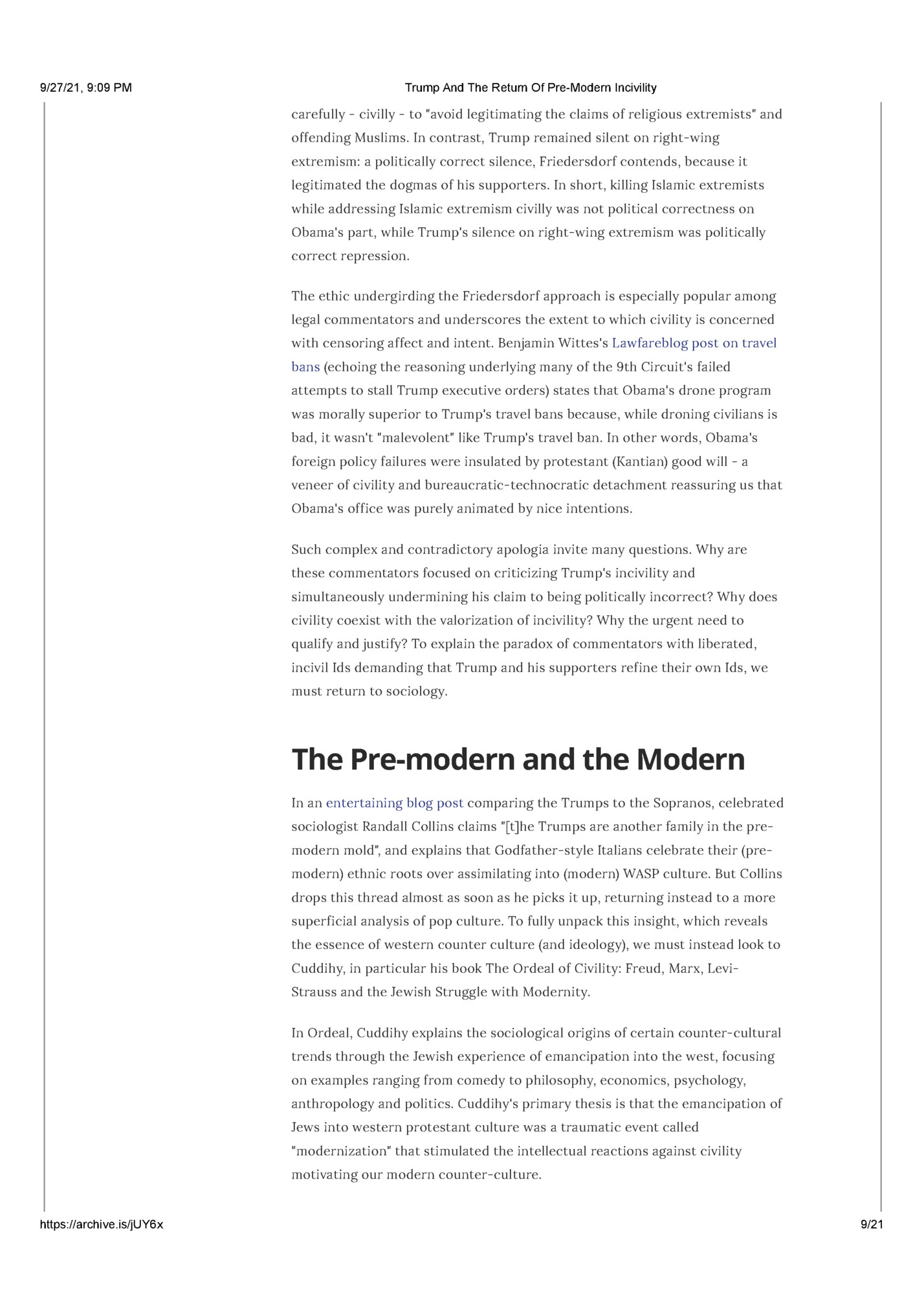
Fleepit Digital © 2021